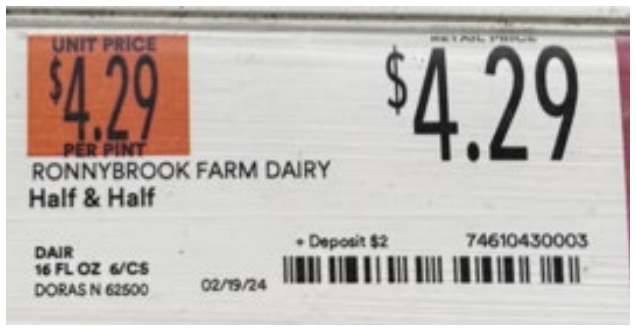Whole Foods Lawsuit Accuses Grocer of Concealing Deposit Fees on Ronnybrook Price Labels
Last Updated on June 18, 2024
Silberstein v. Whole Foods Market Group, Inc.
Filed: June 14, 2024 ◆§ 2:24-cv-04229
A class action lawsuit alleges Whole Foods has deceived consumers by effectively concealing an additional deposit fee on in-store retail price labels.
A proposed class action lawsuit alleges Whole Foods has deceived and misled consumers by effectively concealing an additional deposit fee on in-store retail price labels.
Want to stay in the loop on class actions that matter to you? Sign up for ClassAction.org’s free weekly newsletter here.
The 19-page Whole Foods lawsuit says the grocery store’s deposit fee, in particular for Ronnybrook Farm dairy items, is displayed on price labels in font “so small that it could practically fit inside the decimal point between the dollar and cent figure” of a product’s retail price.
The proposed class action accuses Whole Foods of trying to dupe consumers as to “the true price of the products it sells.”
The plaintiff, a Nassau County, New York resident, contends that he reviewed his receipt after a recent trip to Whole Foods and was shocked to find that the store charged him an additional $6 “container deposit” fee on three Ronnybrook Farm Dairy products, which increased the total cost of the items by almost 50 percent. The consumer claims that, until recently, he was wholly unaware that the prices displayed by Whole Foods for certain Ronnybrook products were far lower than the actual price charged by the grocery store.

“[The plaintiff] did not expect—nor would any reasonable consumer in [the plaintiff’s] position have suspected—that Whole Foods would charge an additional $2.00 for each product,” the case reads.
The total price of the plaintiff’s purchase of a pint of Ronnybrook whole milk, pint of chocolate milk and pint of half and half came to $18.27, with $6 of that cost coming in the form of bottle deposit fees, the suit says. The complaint relays that the bottle of the Ronnybrook products make no mention of a “+ Deposit $2” fee and that a reasonable consumer would have no cause to suspect that the items come with a hidden upcharge.
As the lawsuit tells it, mixed in with other features at the bottom of the Ronnybrook products’ retail labels is a “+Deposit $2” notation. Though the deposit fee is significant, “everything about its presentation is designed to, and has the effect of, concealing it” from shoppers, the filing argues, taking issue with the disclosure’s font size, placement, font style and description.
The case says that although Whole Foods does not add a deposit fee to certain Ronnybrook products sold online, it does so for products sold in store as “it is substantially more difficult to impose hidden fees on online purchases than in-store purchases.”
“Online consumers are presented with an itemized price list on their computer screen or mobile device immediately before placing an order, which is often located adjacent to the ‘order’ button. Instore customers, on the other hand, do not receive an itemized receipt of their purchase, if at all, until after completing the purchase.”
The Whole Foods lawsuit looks to cover all individuals in the state of New York who bought a Ronnybrook product from Whole Foods and was charged a bottle deposit fee between May 4, 2021 and the present.
Are you owed unclaimed settlement money? Check out our class action rebates page full of open class action settlements.
Video Game Addiction Lawsuits
If your child suffers from video game addiction — including Fortnite addiction or Roblox addiction — you may be able to take legal action. Gamers 18 to 22 may also qualify.
Learn more:Video Game Addiction Lawsuit
Depo-Provera Lawsuits
Anyone who received Depo-Provera or Depo-Provera SubQ injections and has been diagnosed with meningioma, a type of brain tumor, may be able to take legal action.
Read more: Depo-Provera Lawsuit
How Do I Join a Class Action Lawsuit?
Did you know there's usually nothing you need to do to join, sign up for, or add your name to new class action lawsuits when they're initially filed?
Read more here: How Do I Join a Class Action Lawsuit?
Stay Current
Sign Up For
Our Newsletter
New cases and investigations, settlement deadlines, and news straight to your inbox.
Before commenting, please review our comment policy.